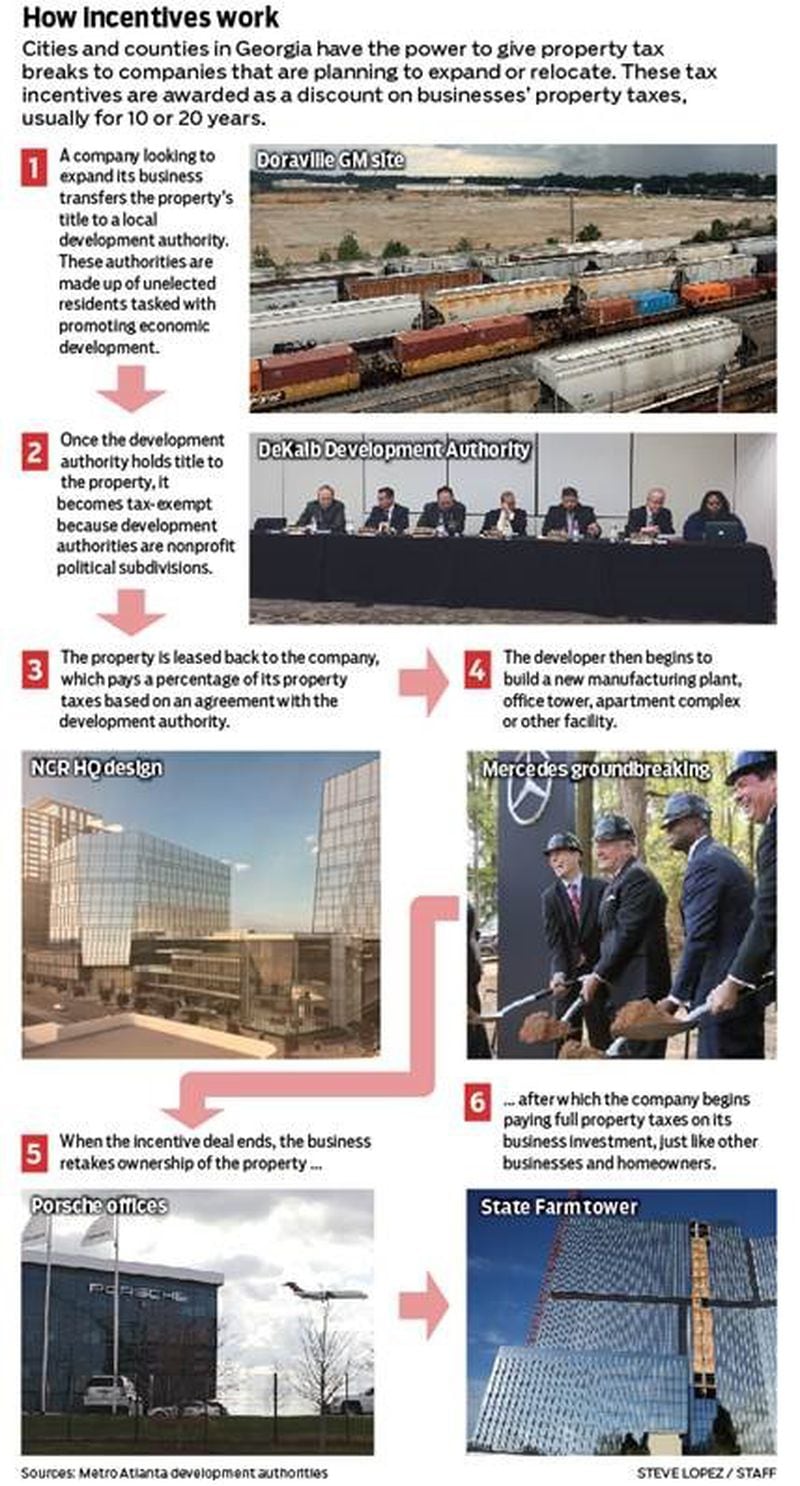They are among metro Atlanta’s defining landmarks and marquee companies, from the upscale Avalon development in Alpharetta to Bank of America Plaza in Midtown, from Town Brookhaven to Coca-Cola.
They're also among the biggest beneficiaries of tax breaks doled out by local governments in 2016. Together, in the name of economic development, governments in Atlanta's four core counties — Fulton, DeKalb, Gwinnett and Cobb — ceded tens of millions in taxes last year, an amount that now can be tallied for the first time because of more rigorous national auditing requirements.
Among the businesses receiving public financial aid are Walmart, Costco, Home Depot, State Farm, SunTrust and more than a dozen other Fortune 500 companies.
Small businesses rarely qualify for similar treatment, but Atlanta’s skyline is dominated by construction projects underwritten by tax dollars, including office towers, mixed-use developments and factories, the figures show.
In all, companies in the four counties received $30.7 million in property tax discounts in 2016, and still owed $72.6 million, according to an examination of records obtained by the AJC under the Georgia Open Records Act. Not included in that amount are hundreds of millions of dollars distributed across the state in film tax credits, jobs credits and sports stadium construction deals.
The tax incentives are intended to help fund corporate expansions and entice companies that create jobs and grow the local economy.
But critics complain that the tax breaks take vital revenue away from schools, police, libraries and other services — to give to companies that might have located in the region anyway. They also say there's little accountability if the projects don't lead to the number of jobs promised.
“The impact is significant,” said DeKalb Superintendent Steve Green, who expressed frustration that the funding could have been used to hire counselors, special education teachers, or math and science teachers, especially in low-performing schools. “We need some relief because we can’t have 30 incentives at a time converging on this school system — not at the expense of crippling or compromising the education need of a school district like ours.”
Businesses and government officials who support tax incentives, however, say they’re a critical tool needed to spur development and keep an area competitive. They also argue that companies give back to the public in many ways — not just by creating jobs and eventually paying their full property taxes, but by stimulating the economy, investing in the community and contributing to charitable causes.
Avalon, a mixed-use "city within a city" built on a property in foreclosure, received nearly $2.6 million in tax breaks last year, the largest abatement in metro Atlanta. Avalon's incentive was a 50 percent discount on the $5.1 million it would have paid otherwise.
The rise of Avalon
When developers bought the 86-acre site for $27 million in 2011, there was little there except a partially built parking deck, said Mark Toro of North American Properties. Previous plans to build a mixed-use community collapsed following the recession.
Today, Avalon is a bustling — and expensive — community, filled with restaurants, a movie theater, yoga classes on the lawn and a tech company office building. Businesses on the $600 million site — including Microsoft, Antico Pizza, Whole Foods and Anthropologie — share the financial benefit of the tax incentives that helped make it happen.
The tax incentives, which last for a decade and decline in value each year, were a “difference maker” for Avalon, Toro said. Without government support, developers wouldn’t have been able to offer amenities like a concierge, entertainment by the Punchline Comedy Club, concerts and other events, he said.
“It’s kind of the poster child” for incentives, Toro said while giving a tour of Avalon. “But for the abatement, would this be the success it is? The answer is no. There’s no question the abatement was a part of our decision.”
About 3,625 people work at Avalon’s office tower, stores, restaurants, management offices.
Avalon is one of 56 projects in Fulton County, including Atlanta, that received tax incentives worth $24.1 million last year. That total is the most of any county examined, but it's an investment that led to 30,165 new or retained jobs, according to the Development Authority of Fulton County.
Credit: Hyosub Shin
Credit: Hyosub Shin
Greg LeRoy, executive director for Washington-based Good Jobs First, has his doubts.
“We’ve basically allowed the companies to make governments into their cash cows,” LeRoy said. “This theme of big companies getting dominant abatements is hardly unique to Atlanta. It reflects the fact that the word is out, and it’s been out for quite a while. If you are a big company with site location consultants, and tax and accounting accountants, you can extract abatements by virtue of your size and lobbying clout.”
Greater transparency
While government agencies in Georgia have been dispensing tax incentives for decades, they never previously showed up on government financial reports. That's changing this year as a result of a rule by the Governmental Accounting Standards Board, known as Statement 77, which requires the value of tax abatements to be disclosed in annual audits. The nonprofit board sets financial reporting standards for U.S. state and local governments.
In the past, it was difficult to find the value of tax incentives through tax records, and the combined impact of local tax breaks on government finances wasn’t measured. Now it will be.
The disclosures will help governments evaluate whether they're making wise decisions when they award incentives, said Al Nash, executive director for the Fulton Development Authority. The information also can be used by businesses to extract the same deals as their competitors, and by residents watching government spending decisions.
“We’ve seen good payback off of these deals,” Nash said. “Companies do have choices, and it is a competitive world out there, and we want to make sure we’re fruitful with these incentives. … It’s not what you gave, but what you get. We’re seeing a lot of benefits out of this.”
Incentives are awarded by county or city development authorities, which are quasi-governmental agencies appointed by local elected officials. These agencies have the power to reduce a business’ property tax bill for years into the future.
The impact is felt by schools, which bear the brunt of incentives because they collect the largest portion of property taxes, as well as county and city governments.
Superintendent Green said there should be a cap on the value of active incentives, which diverted about $3 million from DeKalb's school system last year. He vigorously fought tax incentives for redeveloping the site of the old General Motors factory in Doraville, but he couldn't stop city officials from routing public money to the project.
Joe Hudson, chairman of the Atlanta NAACP Economic Development Committee, said companies aren't doing enough to earn the incentives.
“It bothers me,” he said. “The community should get some kind of return for bearing the burden of the taxes being given away. These funds don’t come back locally. They just go away” to shareholders.
Top beneficiaries
Many familiar companies are on the list of those receiving public benefits for their expansions.
Included are local enterprises like Home Depot, Equifax and Turner, alongside national ones — Comcast, FedEx, Costco and State Farm.
Bank of America Plaza on Peachtree Street, where the tallest building in Georgia is located, received a $1.8 million tax discount last year. The incentives helped the 55-story tower recruit business tenants as it struggled with low occupancy rates while recovering from foreclosure in 2012.
Another local icon, Coca-Cola, benefited from $894,435 in incentives last year, primarily to support the company's investment in Freestyle fountain machines, which allow customers to mix and match a variety of flavors and sodas.
“These abatements helped The Coca-Cola Company make significant investments to expand our facility and capabilities to better serve our customers and consumers around the country,” said spokesman Ben Sheidler in a statement. “We’re pleased that the investments we made, with the support of Fulton County, enabled our facility to add more than 100 jobs at that site” where the machines are manufactured.
Cox Enterprises, the AJC's parent company, also received $1.4 million in tax breaks last year for recently built office towers in Sandy Springs and Brookhaven.
“As an economic driver and philanthropic leader, Cox is committed to the area’s long-term growth. Cox recently made substantial contributions to metro Atlanta’s commercial real estate industry by constructing more than 1 million square feet of office space. And, the company-related foundation has donated nearly $75 million to nonprofits in Georgia since 2012,” said spokeswoman Elizabeth Olmstead in a statement.
Luxury apartment complexes, especially in the Midtown and Buckhead, were awarded tax incentives worth more than $7.2 million. That’s a tax break often criticized because it leads to few jobs.
But such incentives for apartments are valuable when they increase property values on unproductive land and bring in residents who spend money in the area, contributing sales taxes along the way, said Jim Borders, CEO of real estate and development company Novare Group.
Three of the company’s complexes — Skyhouse Buckhead, Skyhouse Midtown and Skyhouse South — received $1.9 million in property tax breaks.
“One misconception seems to be that these projects result in a loss of tax revenue,” Borders said. “An underdeveloped or even blighted location that generates little or no property taxes is transformed through the investment of $75 million to $100 million of capital into a project that will immediately begin generating substantial new tax revenue upon commencement of operations, and will be fully taxable within 10 years.”
The big picture
The 2016 tax incentive disclosures don’t tell the full story — for example, they don’t include state incentives awarded to businesses.
They also don’t cover tax breaks that have been approved but aren’t on the books yet.
In the past three years alone, government development authorities have committed about $500 million in future property taxes for projects in DeKalb, Fulton, Gwinnett and Cobb counties and the city of Atlanta, the AJC reported in March. That figure was derived by calculating the forecast value of properties and future projections over the term of the incentives, which last 10 years or more.
Still, the disclosures provide more information to the public than ever before.
“Governments can gauge where they want to be on this spectrum of abatements,” said Laura Wheeler, a tax expenditure expert for Georgia State University’s Fiscal Research Center. “By knowing where they are and where their peer counties are, they can decide whether they want to be more aggressive in these abatements or less aggressive.”
Top tax incentives in 2016
1. Avalon, $2,566,884
2. Town Brookhaven, $1,782,931
3. Bank of America Plaza, $1,753,599
4. Cox Enterprises, $1,402,172
5. Turner, $1,228,712
6. Alcon Laboratories, $1,187,132
7. PwC, $1,171,201
8. Coca-Cola, $894,435
9. Skyhouse Buckhead Apartments, $864,430
10. 77 12th Apartments, $804,800
Source: AJC analysis of county government records
How we got the story
Until now, the total cost of tax incentives hasn’t been clear. While it was possible to estimate the value of individual tax breaks, their cumulative impact on government finances wasn’t known.
That’s changing this year, the first time that governments must report the value of property tax incentives on their annual audits.
Using Georgia’s open records law, The Atlanta Journal-Constitution obtained documents from county governments showing each property and the amount of its tax incentive. These figures were provided by Cobb, DeKalb, Fulton and Gwinnett counties.
By applying relevant tax rates and incentive percentages, the AJC also calculated the cost of the incentives to school system and city governments.
The numbers revealed that $30.7 million in local property tax incentives were distributed in these four counties in 2016. The 182 properties that received incentives still owed $72.6 million in property taxes.
Tax incentives in 2016 by jurisdiction
Atlanta: $15.9 million
Cobb: $873,982
DeKalb: $5 million
Fulton (excluding Atlanta): $8.2 million
Gwinnett: $696,561
Total: $30.7 million
MYAJC.COM: REAL JOURNALISM. REAL LOCAL IMPACT.
The AJC's Mark Niesse keeps you updated on the latest happenings in DeKalb County government and politics. You'll find more on myAJC.com, including these stories:
Never miss a minute of what's happening in DeKalb politics. Subscribe to myAJC.com.










